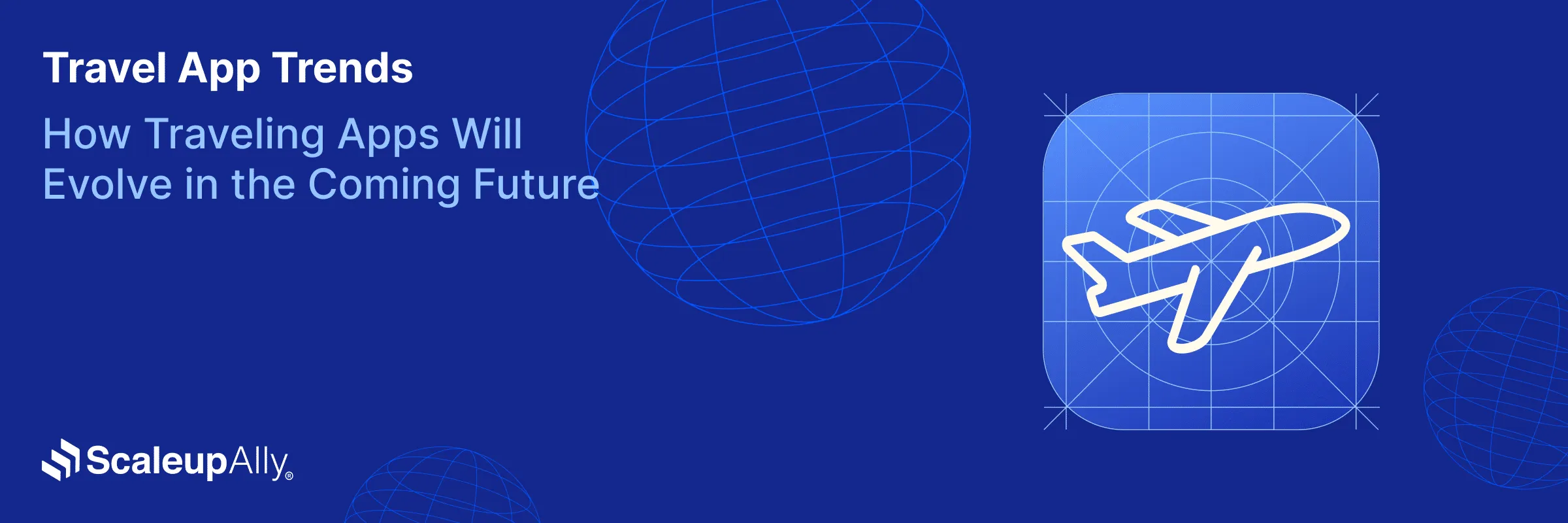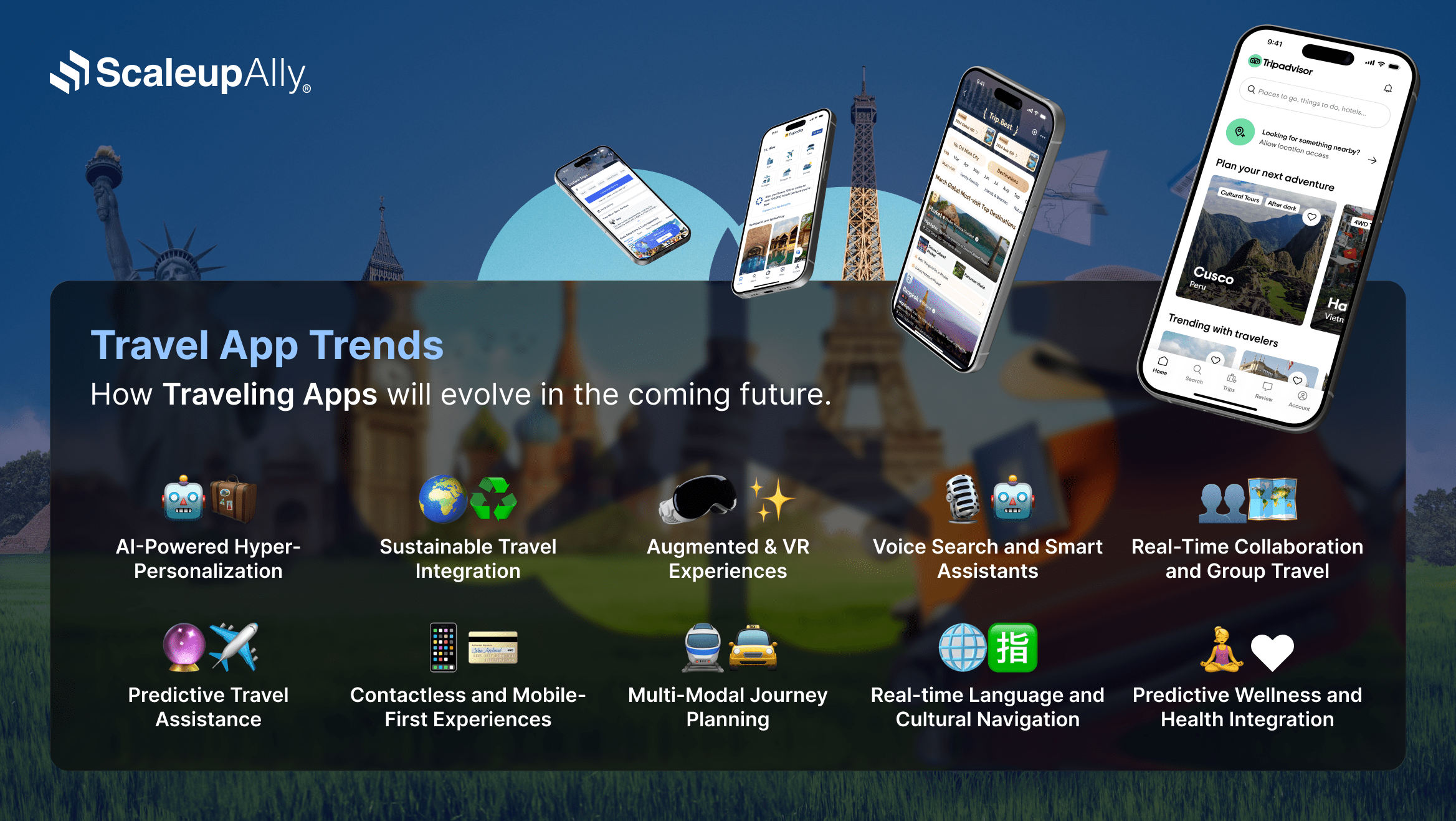
Travel App Trends: How Traveling Apps Will Evolve in the Coming Future
Suprabhat Sen | August 30, 2025 , 11 min read
Table Of Content
Travel apps now book our flights, find restaurants, translate menus, and even tell us which subway car to board. We’re just getting started anyway. They’re evolving rapidly—and if you don’t keep up, you’ll fall behind.
We’ve all seen how quickly user expectations shift – one day, everyone’s fine with basic booking, the next, they want AI chatbots and instant everything. The travel app trends emerging right now aren’t just nice-to-haves anymore; they’re becoming table stakes for anyone serious about competing in this space. This blog explores those trends.
Key Takeaways
- Travel apps now do more by making trips more personalized, and resolving issues before they are made known to you.
- 59% of travelers are willing to pay to offset emissions. For this, apps are integrating carbon tracking, eco-friendly filters, and green transportation options as standard features.
- AR/VR is being used practically in the travel industry in virtual hotel tours, real-time translation overlays, and interactive navigation. This is leading the VR travel market growth by 30% annually.
- Travel apps are becoming digital wallets, room keys, and boarding passes all in one. This is making travel completely phone-based.
- Apps are connecting like-minded travelers, providing cultural coaching, and creating location-based communities that make traveling alone feel less lonely and more authentic.
Overview of the Travel Apps Market
The global travel apps market reached $650.7 billion in 2024. Projected to hit $3,552.7 billion by 2034, it’s a five-fold increase in just ten years, with an annual growth rate of 18.5%. To put this in perspective, the entire travel app ecosystem is growing faster than most national economies.
Global travel app downloads reached 2.15 billion in the first nine months of 2024 alone, with revenue hitting $140 million. That’s a 19.5% jump in revenue from the previous year.
Also, the travel booking industry lost more than 70% of its traffic during the pandemic, but it took just two years for most apps to bounce back. Over 850 million people used travel apps in 2023.
Regionally, North America dominates with 35.6% of the market share, generating $231 billion in 2024. The U.S. alone accounts for $185.3 billion, driven by a 16.5% growth rate.
India leads global downloads with 15% of the total, followed by the U.S. and China’s iOS market at 14% and 10% respectively. When it comes to revenue, Europe and the U.S. markets account for 40% and 38% of global travel app revenue.
In terms of platform choice, Android dominates with 45.7% of the travel app market, while iOS generates nearly 65% of total app revenue despite fewer downloads. This pattern holds across most app categories – Android gets the volume, iOS gets the money.
If we explore who uses these apps, leisure travelers make up 28.7% of the market, but that means business travelers and other segments account for the majority. Among surveyed travelers, 80% feel it’s important to book trips entirely online, with 86% of Millennials and 83% of Gen Z leading this trend. 53% say they book online because of how quickly they can plan trips.
Booking services dominate the market with 34.8% of total share, while subscription-based models account for 40.6% of the revenue.
Top 10 Trends in Travel Apps to Watch out for

The travel app trends in this blog are soon becoming the foundation and the reality of how people discover, plan, and experience trips. In the outburst of AI and other technologies, travelers expect their apps to think ahead, solve problems, and create moments they couldn’t have imagined. We give you ten travel app trends for 2025.
1. AI-powered hyper-personalization
Travel apps in 2025 are getting good at reading your mind. Not in a telepathic sense, but the ability to know you prefer window seats, remember you’re lactose intolerant, and suggest restaurants based on your Instagram activity, all thanks to AI integration.
It is no surprise that nearly one in five millennials used generative AI for trip planning in 2024. Many consumers now book trips based on AI recommendations. These Apps analyze your browsing patterns and your social media posts to build detailed traveler profiles.
More to the point, these apps can suggest alternative destinations when your first choice gets too crowded. It automatically reschedules flights during delays, and even books dinner reservations at places that match your taste profile.
2. Sustainable travel integration
59% of travelers say they will pay to offset their carbon emissions when they travel. To add to that, 50% also say they’d generally choose sustainable travel options because they care about the impact of their travels. Apps are responding by making sustainability data as prominent as price comparisons.
For travel app market trends for 2025, the global ecotourism market size is expected to reach $270.5 billion, and is projected to reach USD 551.8 billion by 2035. This growth is driving apps to partner with verified eco-tourism operators and provide detailed sustainability ratings for hotels, flights, and activities.
Still on sustainability, 73% of travelers are more likely to choose accommodation providers that advertise their sustainability practices. To capture the market, travel apps are now showing carbon emissions data for flights, highlighting hotels with green certifications, and suggesting public transportation alternatives.
3. Augmented and virtual reality experiences
The virtual tourism market alone is set to grow at a compound annual growth rate of 24.9% between 2024 and 2030, reaching a valuation of $30.54 billion. But the real action is in augmented reality applications that enhance real-world travel experiences.
The AR/VR in travel and tourism industry is projected to reach $109.13 billion in 2029, with a CAGR of 38.6%. The technology is becoming sophisticated enough that travelers can virtually walk through hotel rooms before booking, preview restaurant atmospheres, and even test-drive rental cars through VR experiences.
4. Voice search and smart assistants
41% of adults now use voice search at least once per day, with more than half of all smartphone users engaging with voice search technology to some degree. Travel apps are optimizing for natural language queries like “find me a pet-friendly hotel near the beach in San Diego for next weekend.”
46% of people who travel have used voice search to find or book places to stay, while 72% of travelers would prefer using voice-activated helpers to ask for hotel services like food delivery or cleaning.
5. Real-time collaboration and group travel
96% of respondents plan to travel internationally in 2025, with 51% of those respondents planning to take 3 or more international trips throughout the year. Many of these trips involve groups.
Apps are introducing features like shared itineraries where group members can vote on activities, split bills automatically across different payment methods, and get real-time location sharing for coordinating meetups. Some are using AI to find compromises when group members have conflicting preferences – suggesting restaurants that accommodate both vegetarians and meat-eaters, or finding hotels that balance luxury preferences with budget constraints.
Traveling apps are coordinating flight bookings so everyone gets seats together and managing group discounts for activities.
6. Predictive travel assistance
Apps using AI saw measurable improvements in user engagement and retention. Some can predict when hotels will drop prices based on booking patterns and automatically rebook you at lower rates. Others use location data to suggest earlier departures for appointments when they detect traffic building up.
The goal is for your app to quietly handle problems in the background so your trip goes smoothly without you ever knowing what could have gone wrong.
7. Contactless and mobile-first experiences
The pandemic accelerated contactless technology adoption, but the convenience factor is keeping it around permanently. Travel apps are becoming digital wallets, room keys, boarding passes, and restaurant menus all in one.
Contactless payments and mobile wallets will be the norm in travel apps, enabling faster and more secure transactions for booking accommodations, flights, and local establishments. But it goes beyond payments to encompass the entire travel experience.
Hotels are implementing mobile check-in where your phone becomes your room key, restaurants are moving to QR code menus that link to mobile ordering systems, and airlines are testing facial recognition boarding that doesn’t require any physical documents. Apps are coordinating all these touchpoints so you can travel with just your phone and never have to hand physical cards or documents to anyone.
8. Multi-modal journey planning
The best travel apps are thinking in terms of complete journeys. This means apps that can plan a trip involving flights, trains, ride-shares, bike rentals, and walking routes as one connected experience. Some apps are even optimizing for sustainability by finding the lowest-carbon path between multiple destinations.
The intelligence extends to accommodation too – apps that can book a mix of hotels, Airbnbs, and hostels based on different legs of your journey, or that coordinate business hotel stays with leisure weekend accommodations in the same booking flow.
The goal is to make complex, multi-destination trips as easy to plan as a simple flight-and-hotel vacation.
9. Real-time language and cultural navigation
Apps can now read signs, menus, and documents in real-time, then overlay translations directly onto your camera view. But the real breakthrough is cultural context. These apps explain why certain gestures might be offensive, suggest appropriate tipping amounts based on local customs, and even coach you through business meeting etiquette in different countries.
Some apps even learn your cultural background and highlight differences that might surprise you, like warning Americans that tipping taxi drivers isn’t expected in Japan.
The really clever apps are crowdsourcing cultural intelligence from locals and experienced travelers, building databases of social situations and appropriate responses that go way deeper than any traditional phrasebook ever could.
10. Predictive wellness and health integration
Travel used to mean abandoning your health routine. Now apps are helping maintain wellness goals while adapting to new environments, time zones, and activity levels. These apps monitor sleep patterns and suggest optimal departure times to minimize jet lag.
The health integration goes deeper than fitness. Apps are tracking your medication schedule and sending reminders adjusted for new time zones. They’re monitoring local air quality and pollen counts if you have allergies. Some even suggest restaurants based on dietary restrictions that go beyond simple “vegetarian” filters – finding places that can accommodate specific medical diets or cultural food requirements.
Conclusion
Travel app trends in 2025 show us that the industry is heading toward smarter, greener, and more connected experiences than ever. Ready to build the next generation of travel apps? Contact us today to turn these trends to your advantage.
Frequently Asked Questions
Q: What is the future of travel apps?
Travel apps are becoming AI-powered assistants that anticipate your needs, support eco-friendly choices, and offer AR/VR for immersive trips. Future apps will feature voice control, secure blockchain systems, and community-sourced recommendations.
Q: What features make a travel app successful in 2025?
Successful travel apps combine AI personalization, sustainability tracking, AR/VR experiences, voice search, contactless payments, and social community features.
Q: How can travel businesses benefit from adopting new app trends?
Businesses adopting AI personalization see 13% increases in user purchases. New trends reduce operational costs, improve customer satisfaction, attract eco-conscious travelers, and create competitive advantages.
Q: How are personalization and AI shaping user experience in travel apps?
AI analyzes 23+ million data points to create custom itineraries, predict preferences, and solve problems automatically. 71% of travelers prefer personalized experiences. AI enables apps to suggest destinations, rebook flights during delays, and provide recommendations before users even ask.
Related Blogs

Online Shopping App Development Cost in UAE | Pricing & Factors Explained
Understand UAE online shopping app development costs in 2025 with pricing ranges, influencing factors, hidden fees, timeframes, and expert savings tips.
Suprabhat Sen
Nov 29 ,
13 min read

Restaurant App Development Cost [Breakdown, Key Factors & Pricing Explained]
Discover restaurant app development cost. Explore pricing by complexity, feature-wise cost breakdown, and smart ways to reduce expenses.
Suprabhat Sen
Nov 29 ,
11 min read

App Development Cost in Dubai: Detailed Pricing Breakdown & Cost Factors
Discover app development cost in Dubai — staged price breakdown by app type, key cost drivers, hidden fees, and tips to lower your project spend.
Suprabhat Sen
Nov 29 ,
12 min read


